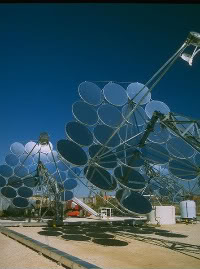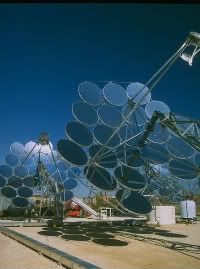Is Solar Energy Over-Hyped? – By Guest-blogger Anil


Solar energy comes in the form of radiations which are used to produce electricity in addition to heating applications. Silicone based panels are used to collect the radiation. Solar energy is environment friendly because it has virtually zero greenhouse emissions. Primarily, this is the reason that the energy form has been promoted by the government. Barring the initial capital cost, solar energy is maintenance free and doesn’t require any subsequent investment.
The government is encouraging the use of solar energy by giving federal aids to the equipment manufacturers and giving rebates to the end consumers through electric utilities. While the stimulus funds by government drives down the price of the solar panels on the manufacturing side, consumer rebates drive the retail market. In addition, solar photo-voltaic (PV) manufacturers are successfully tapping the capital markets to raise money. Two thin film solar technology companies raised more than US$400 million last week.
Electric utilities in the US have been giving rebates to the customers for installing rooftop solar energy systems. Even with a growing market, increasing consumer interest and rebates, the use of solar energy continues to be small compared to other forms of energy. Solar power generates only about 0.02 percent of the world’s energy supply.
A part of the problem lies with the cost. Traditional economics tells that mass production of a commodity leads to lower costs, but the companies involved in solar panel production have not been able to do so. Although, the production cost of solar panels has been decreasing over years, the industry has faced a new setback in the form of economic slump last year. It has become more expensive for a utility or company to raise capital to build solar projects this year than in the previous years. High cost of financing in this high capital investment industry is the proverbial straw which breaks the camel’s back.
Pressure on the margins has compelled the companies to look for the ways to cut corners. As happened with Evergreen Solar, the company started a facility in Devens, Boston (Massachusetts) this summer with much fanfare and promise to create green jobs. The state helped the facility to the tune of US$58 million only to see around 400 of the newly created jobs being shifted to China. While the company can be accused of backstabbing the government aid in light of having tripled its sales last year, the truth remains that the company lost as much as three times last year due to higher cost.
Quite similar was the fate of a planned facility in Auburn (Massachusetts) by Boston Power Inc. The company was seeking federal aid of US$100 million to build a factory creating 600 jobs. Boston Power, which makes advanced batteries to store energy generated by the solar panels, decided not to invest its own money after it failed to garner support from the government.
More on this tomorrow.

Note that solar panels are not based on silicone. Rather, they are based on silicon.